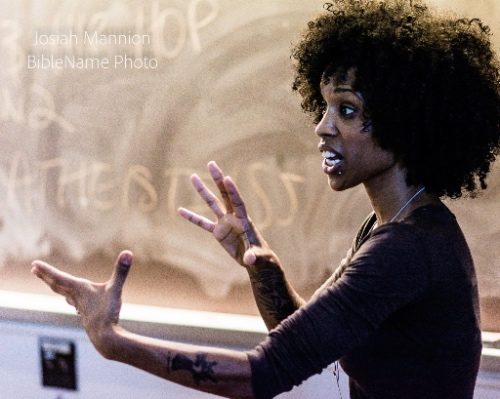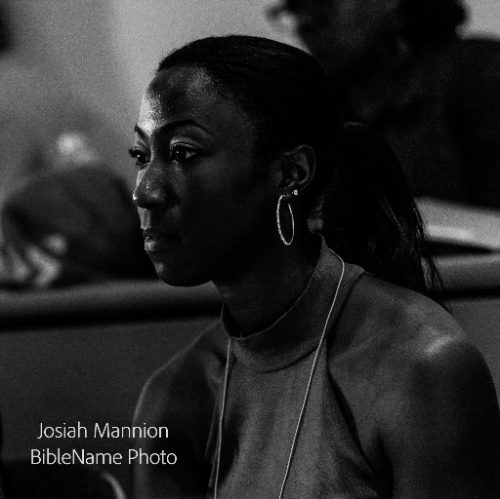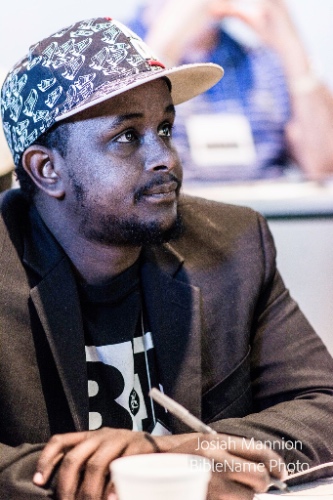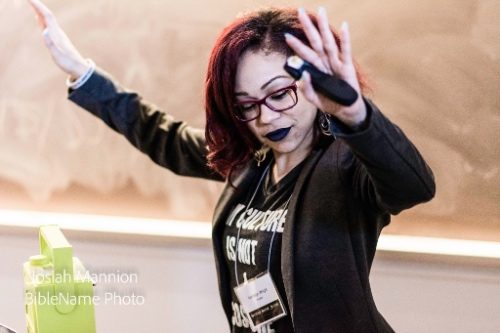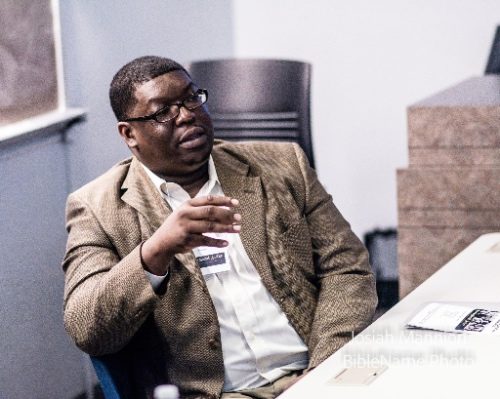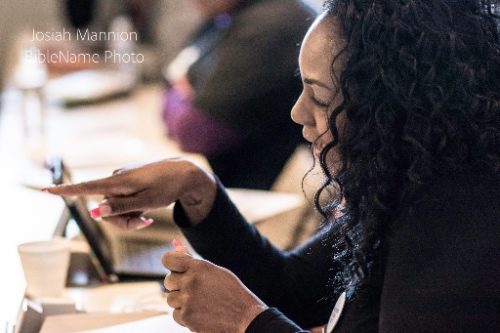This is part of my coverage of the Secular Social Justice Conference this past January in Houston. I raised money to get me to the conference to report out because conferences like these cover topics that are rarely talked about in the movement. I also raised money to get Josiah Mannion to the conference to take photos. You can see his full conference photoset. If you appreciate the work we do, we’re also raising money cover a portion of our costs to do the same for the Women in Secularism conference in September. You’ll find a donation button at the end of this post.
After opening remarks, which I’ll cover in a post summarizing the experience of attending the conference, we split off into two sessions. Josiah took pictures in the “Humanism and Hip Hop” session, because you can’t keep him away from that. I covered “Feminism(s) of Color” for much the same reason.
Humanism and Hip Hop
Monica Miller, Lehigh University
Jason Jeffries, Rice Univ.
Xan Wright, HBN
Moderator: Tony Pinn
This was a well-attended session but most of the tweeters were in the other session. I watched the panel and added my reflections/encapsulations here to the tweets of the people in the room. Hopefully they’ll whet your appetite to watch the whole thing. You’ll find the full video of the panel at the bottom of this post. You may need to watch it more than once, because I’ve never seen anyone talking about humanist hip hop in a way that was anything less than richly dense with information and overturned assumptions.
#SSJCon yeeeeesssssss. I'm actually here! Humanism & HipHop starting. @religionhiphop @anthony_pinn
— BibleName (@BibleName) January 30, 2016
Introducing Dr. Monica Miller, Tony Pinn points out that she and her colleagues at Lehigh University studying Africana religion just received a $2 million grant.
@religionhiphop opening up the #humanism & #hiphop panel discussing the flow of Black escape & protest #SSJCon
— SecularSocialJustice (@SSJCon) January 30, 2016
Monica Miller notes the contradiction of hip hop both supporting and undercutting social justice in its history and its central place in Black Lives Matter.
"Black expressive culture has always been a really effective, subversive way of communication" @religionhiphop #SSJCon
— SecularSocialJustice (@SSJCon) January 30, 2016
#SSJCon Humanism and Hip Hop. Speaking the Real.
— Anthony Pinn (@anthony_pinn) January 30, 2016
Hip hop is infused with Black social protest & Black radicalism @religionhiphop #SSJCon
— SecularSocialJustice (@SSJCon) January 30, 2016
Black Lives Matter’s embrace of hip hop situates it generationally and as a rejection of respectability politics.
BLM isn't your grandma's movement, isn't a bowtie brotherhood movement. Not rooted in religion as previous movements @religionhiphop #SSJCon
— SecularSocialJustice (@SSJCon) January 30, 2016
Hip hop is informed by and reliant on black religious expressions, both gospel and black Islam.
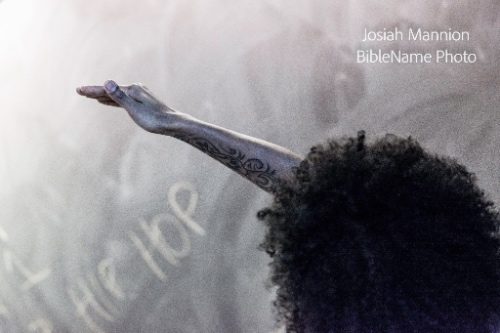
"Not All The Godz Are Men"#SSJCon #HipHop pic.twitter.com/51ZaX60YOM
— BlackFreethinkers_MN (@BLF_MN) January 30, 2016
Hip hop cipher is a blend of ingenuity/creativity. A conglomerate of Black authority that combats social injustice @religionhiphop #SSJCon
— SecularSocialJustice (@SSJCon) January 30, 2016
The visual creativity of hip hop becomes a tool to react to ongoing injustices quickly and effectively.
Hip hop generation ingenuity: Example – Cecil the lion & brutality on black people @religionhiphop #SSJCon
— SecularSocialJustice (@SSJCon) January 30, 2016
White prof. published "10 Cracka Commandments" for whites to follow to understand their place re: #BlackLivesMatter @religionhiphop #SSJCon
— SecularSocialJustice (@SSJCon) January 30, 2016
Social ills reimagined as “old gods” to be thrown off.
Talking about and naming whiteness as a thing that exists in relationship to black lives and black bodies is viewed as dangerous.
dr. monica r. miller dropping knowledge: humanism & hip-hop panel at the secular social justice conference. #ssjcon pic.twitter.com/dCCQpsfvJ8
— zora da great (@zorafuture) January 30, 2016
Hip hop: Taking down iconic authorities, address worth of black humanity, push against perceived hegemonic ideas @religionhiphop #SSJCon
— SecularSocialJustice (@SSJCon) January 30, 2016
Race is a social construct which determines how groups are described/understood/addressed/treated – Jason Jeffries #SSJCon
— SecularSocialJustice (@SSJCon) January 30, 2016
Hip hop itself is diverse, though this may be underestimated because all of hip hop is seen as “other” by mainstream society.
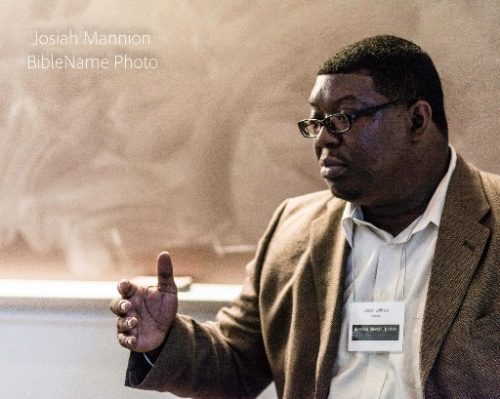
If #humanists accountable for human condition, the problem of race/inequities created by racism must be a concern -Jason Jeffries #SSJCon
— SecularSocialJustice (@SSJCon) January 30, 2016
rice phd student jason jeffries putting hip-hop and humanism in conversation: humanism & hip-hop panel. #SSJCon pic.twitter.com/Xy0nkBG8hc
— zora da great (@zorafuture) January 30, 2016
Cultural products like hiphop reflects history, experiences of joy/pain within a dehumanizing racist society – Jason Jeffries #SSJCon
— SecularSocialJustice (@SSJCon) January 30, 2016
Hiphop largely centered on pleasure/struggles of life. Sometimes use religious language to discuss material reality – Jason Jeffries #SSJCon
— SecularSocialJustice (@SSJCon) January 30, 2016
Both #humanism & hiphop culture ultimately concerned with "this world" – Jason Jeffries #SSJCon
— SecularSocialJustice (@SSJCon) January 30, 2016
#humanism & hiphop culture both have been marginalized by religious institutions – Jason Jeffries #SSJCon
— SecularSocialJustice (@SSJCon) January 30, 2016
#Humanism's aim toward social justice should be a strategic planning for issues of #socialjustice – Jason Jeffries #SSJCon
— SecularSocialJustice (@SSJCon) January 30, 2016
The Value of Hip Hop to Humanists: Provide some strategies for improving or overcoming their own conditions – Jason Jeffries #SSJCon
— SecularSocialJustice (@SSJCon) January 30, 2016
#Humanism & hiphop culture both challenge religious & social norms – Jason Jeffries #SSJCon
— SecularSocialJustice (@SSJCon) January 30, 2016
#humanism & hiphop culture both discuss the rituals & practices of everyday life – Jason Jeffries #SSJCon
— SecularSocialJustice (@SSJCon) January 30, 2016
"Hip Hop culture is largely centered on the pleasure and struggle of human life."#SSJCon #HipHop
— BlackFreethinkers_MN (@BLF_MN) January 30, 2016
Jason Jeffries now discussing the value of hiphop to #humanists #SSJCon
— SecularSocialJustice (@SSJCon) January 30, 2016
Reality/gangsta rap "we're not influencing people to be violent, we're just reporting the news" – Jason Jeffries #SSJCon
— SecularSocialJustice (@SSJCon) January 30, 2016
Tupac’s Black Jesus wasn’t an ethereal being concerned with Heaven, but the “patron saint of thugs” who looked after people as and where they were.
Reality/gangsta rap provides critique of society highlighting damage done by humans b/c capitalist greed/oppression – Jason Jeffries #SSJCon
— SecularSocialJustice (@SSJCon) January 30, 2016
Progressive rap interprets cycle of poverty/dehumanization to critique social structures; usually politically aware – Jason Jeffries #SSJCon
— SecularSocialJustice (@SSJCon) January 30, 2016
Progressive rap interprets cycle of poverty & dehumanization of Blacks – Jason Jeffries #SSJCon
— SecularSocialJustice (@SSJCon) January 30, 2016
Jeffries gives examples of songs, mostly chosen to be recent, addressing abortion, poverty, unequal justice, domestic violence, police brutality, gentrification, and corporate greed.
Examples of #socialjustice issues in hiphop include "Retrospect for life" (abortion) "The Message" (poverty) – Jason Jeffries #SSJCon
— SecularSocialJustice (@SSJCon) January 30, 2016
examples of #socialjustice issues discussed in hiphop — "love is blind" (domestic violence/rape) – Jason Jeffries #SSJCon
— SecularSocialJustice (@SSJCon) January 30, 2016
When I think #humanism I think togetherness/bettermentl/consideration/accomodation/empathy/concern/responsibility – Xandelyn Wright #SSJCon
— SecularSocialJustice (@SSJCon) January 30, 2016
When I think #hiphop dance/ rap/ r&b/ Black culture/ lifestyle/ popular/ always current – Xandelyn Wright #SSJCon
— SecularSocialJustice (@SSJCon) January 30, 2016
#ssjcon Humanism and Hip Hop … Swag with a purpose.
— Anthony Pinn (@anthony_pinn) January 30, 2016
Xandelyn Wright’s studies Christian religious privilege, secularism, and interfaith dialogue within black communities more than hip hop directly.
Both #humanism & #hiphop is about the human experience – Xandelyn Wright #SSJCon
— SecularSocialJustice (@SSJCon) January 30, 2016
xandelyn wright (houston black non-believers) brought the boom-box to the humanism & hip-hop panel! 📻 #ssjcon pic.twitter.com/4md3VPp4bY
— zora da great (@zorafuture) January 30, 2016
Humanism is about people taking control of the messages around their own lives more than eradication of religion.
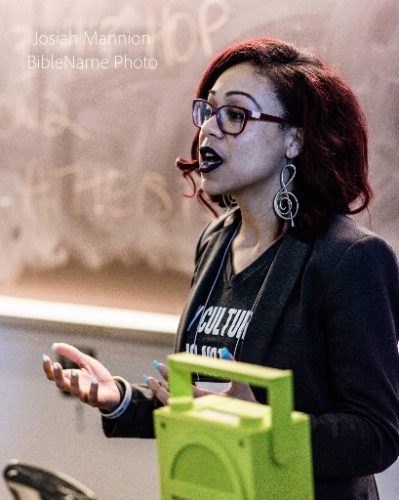
#HipHop relays H (Honesty) I (Intensity) P (Pressure) H (Hope) O (Outspoken) P (Power) – Xandelyn Wright #SSJCon
— SecularSocialJustice (@SSJCon) January 30, 2016
"Nothing will work unless you do." – Maya Angelou – Xandelyn Wright #SSJCon
— SecularSocialJustice (@SSJCon) January 30, 2016
Even where hip hop isn’t expressly political, it demonstrates a range of attitudes and expressions about any and all facets of life, expanding the range of things it’s acceptable to think and feel. It provides a richness of experience and role play.
Examples of #socialjustice issues in #hiphop "Early" (Police Brutality/Racial Profiling) – Xandelyn Wright #SSJCon
— SecularSocialJustice (@SSJCon) January 30, 2016
Examples of #socialjustice issues in #hiphop "Hood Robbin" (Unfair lending practices/gentrification) – Xandelyn Wright #SSJCon
— SecularSocialJustice (@SSJCon) January 30, 2016
Examples of #socialjustice issues in #hiphop "Word I Never Said" (Capitalism/Corporate Greed) – Xandelyn Wright #SSJCon
— SecularSocialJustice (@SSJCon) January 30, 2016
Examples of #socialjustice issues in #hiphop "Hot Seat" (Unequal Justice in legal system) – Xandelyn Wright #SSJCon
— SecularSocialJustice (@SSJCon) January 30, 2016
From the Q&A after the presentations:
#hiphop functions as a rugged interpretation of real life w/complexity – @religionhiphop #SSJCon
— SecularSocialJustice (@SSJCon) January 30, 2016
#hiphop fuses the sacred & the profane while confronting everyday experiences @religionhiphop #SSJCon
— SecularSocialJustice (@SSJCon) January 30, 2016
A flaw of some forms of #humanism is when it becomes compounded by institutionalization rather than just "being" like #hiphop #SSJCon
— SecularSocialJustice (@SSJCon) January 30, 2016
#hiphop is effective at communicating the messiness of life in an honest way @religionhiphop #SSJCon
— SecularSocialJustice (@SSJCon) January 30, 2016
Many times we limit ourselves. Humans are circles trying to fit themselves into square boxes – Xandelyn Wright #SSJCon
— SecularSocialJustice (@SSJCon) January 30, 2016
Like anything else, we can romanticize our classic hip hop.
#hiphop creates a space for marginalized individuals to be heard – can #humanism do the same? – #SSJCon
— SecularSocialJustice (@SSJCon) January 30, 2016
This session is really hard to capture in the short form, and none of this will give you the clips of music that were played. For the full experience, watch the video.
Want to support this kind of reporting out from Women in Secularism? We could still use a little help to get there:


